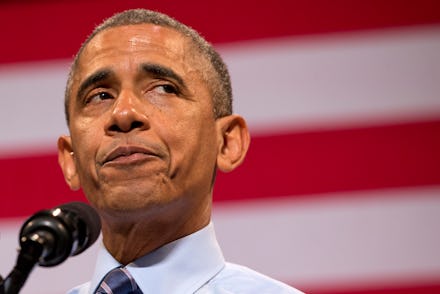After 2,000 Days, 3 Charts Shows How Good President Obama Has Been for the Economy

The news: Compared to his predecessors, Obama's been pretty great for the economy. At 2,000 days into his presidency, Obama ranks in the top half of the eight presidents since the Great Depression who spent this much time in office in terms of stock market performance, according to MarketWatch.
Image Credit: MarketWatch
Major stock indices have averaged gains of more than 142% under the president, compared to 88.3% for Ronald Reagan and well ahead of George W. Bush and Richard Nixon. Democrats in general have averaged 133%, while Republicans have averaged measly 33% gains. Yes, that's a full 100% better.
And if you look at daily stock gains, Obama is second only to Clinton. This makes right-wing accusations from the likes of the Wall Street Journal that Obama has prioritized reducing inequality over growth look more than a little silly.
Image Credit: MarketWatch
Of course, after the 2008 housing bubble and stock market crash, Obama's recovery efforts likely had nowhere to go but up. The same principle held true for FDR in the '30s, which helps explain his high ranking.
Is it really that great? Things are definitely picking up. The economy added 288,000 new jobs in June alone, a big sign that the economy is starting to pick up steam again. Sixty percent of the new positions paid more than the U.S. average hourly rate of $24.45, or about $48,900 annually pre-tax.
Still, wages remain pretty stagnant — growing at just 2% a year — and the average pay of seven of the top 10 most common occupations (when adjusted for inflation) has shrunk since 1999. Certain groups are still doing very poorly, like Millennials, many of whom remain financially dependant upon their parents.
Even more troubling is that the booming stock market mostly benefits the rich. Between 2009 and 2012, 90% of the overall increase in inflation-adjusted consumption was driven by the top 20%. The top 10% of Americans have gone from owning 67% of the country's wealth in 1989 to nearly 75% in 2010. RBS economist Guy Berger estimates that 50% of Americans have no effective participation in the stock market. Sky-high stock markets are likely masking a raw deal for the average American.
But hear me out: It's no secret that many Americans are still worse off than they were in 2008. Really, though, this has an awful lot to do with organized labor's declining power, which has shrunk from 40% of the private workforce after World War II to just 7% today, and Bush's disastrous eight years in office. Obama couldn't possibly be responsible for the financial crisis and the mass die-off of middle-class wealth, which began during the tail end of the Bush administration. The Economic Policy Institute's Andrew Fieldhouse puts this in perspective: By the time Obama took office, the U.S. had lost 4.5 million jobs and the economy had reached an absolutely staggering 8.9% annualized decline. The Center for Economic and Policy Research's Dean Baker says that if Obama is guilty of anything, it's not pushing enough economic stimulus.
What's more, New York Times' Paul Krugman has pointed out that Obama has made significant headway toward bringing taxes on the very wealthy back to pre-Reagan levels. That is a big achievement for people who think the slow recovery has a lot to do with high inequality.
Image Credit: The Atlantic
Given the immense economic crisis that Obama inherited in 2009 and staggering attempts by congressional Republicans to block major elements of his economic agenda, it seems like he's managed to do alright. The worst thing you can say is that he hasn't pushed his agenda hard enough.
We still have two more years of Obama and as he approaches the end of his presidency, he's thankfully getting feistier (and the country is getting more liberal). Republicans in 2016 could find themselves stammering over a significantly improved economy and because they've stood in the way of every major policy move this administration has made, they won't be able to take credit for it.